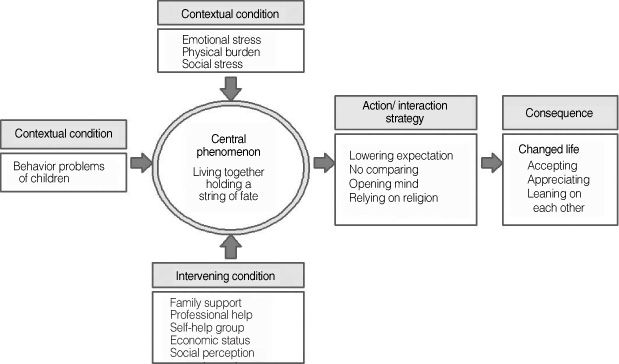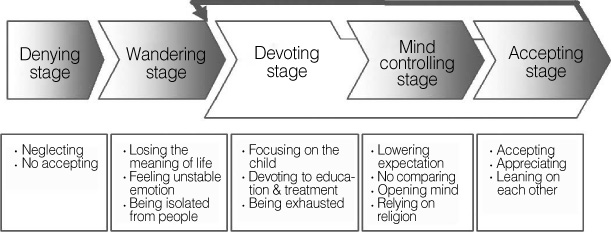J Korean Acad Nurs.
2010 Dec;40(6):808-819. 10.4040/jkan.2010.40.6.808.
Life Transition of Mothers of Children with Autism
- Affiliations
-
- 1Department of Nursing, Wonkwang Health Science College, Iksan, Korea.
- 2Department of Nursing, Kangwon National University, Chuncheon, Korea. swhongks77@freechal.com
- 3Department of Nursing, Gachon University of Medicine and Science, Incheon, Korea.
- 4Department of Nursing, Namseoul University, Cheonan, Korea.
- KMID: 999483
- DOI: http://doi.org/10.4040/jkan.2010.40.6.808
Abstract
- PURPOSE
While there are a number of studies on children with disabilities, there have been few studies on mothers of children with autism. The purpose of this study was to explore the process of life transition of mothers who have children with autism.
METHODS
From June 2007 to May 2009, the researcher interviewed 15 mothers of children with autism living in Seoul City, Gyeonggi or Chonbuk Provinces, and then analyzed the data gathered using the constant comparative method of grounded theory.
RESULTS
"Living together holding a string of fate" was a core category showing along the continuum of life. The basic social process of life transition encompassed 5 stages: stages of denying, wandering, devoting, mind controlling, and finally accepting. These five stages proceeded in phases, though returned back to the wandering stage occasionally.
CONCLUSION
This study has opened the door to understanding how mothers of children with autism experienced life transition. The findings suggest that differentiated support and care at each stage should be given and there is the need to develop transition assessment tools for mothers of children with autism.
Keyword
MeSH Terms
Figure
Reference
-
1. Corbin J, Strauss A. Basics of qualitative research. 2008. 3rd ed. Thousand Oaks, CA: Sage Publications.2. Duarte CS, Bordin IA, Yazigi L, Mooney J. Factors associated with stress in mothers of children with autism. Autism. 2005. 9:416–427.3. Glidden LM, Billings FJ, Jobe BM. Personality, coping style and well-being of parents rearing children with developmental disabilities. Journal of Intellectual Disability Research. 2006. 50:949–962.4. Green SE. "We're tired, not sad": Benefits and burdens of mothering a child with disability. Social Science & Medicine. 2007. 64:150–163.5. Hassall R, Rose J, McDonald J. Parenting stress in mothers of children with an intellectual disability: The effects of parental cognitions in relation to child characteristics and family support. Journal of Intellectual Disability Research. 2005. 49:405–418.6. Im SB. Effects of a mother-child attachment promotion program for children with pervasive developmental disorder. 1997. Seoul: Seoul National University;Unpublished doctoral dissertation.7. Johnson BS. Mothers' perceptions of parenting children with disabilities. MCN. The American Journal of Maternal Child Nursing. 2000. 25:127–132.8. Registered disabled persons data. Korean Statistical Information Service. 2009. 06. Retrieved July 17, 2010. from http://kosis.kr/nsportal/themes/themes_03List.jsp.9. King GA, Zwaigenbaum L, King S, Baxter D, Rosenbaum P, Bate A. A qualitative investigation of changes in the belief system of families of children with autism or Down syndrome. Child: Care, Health and Development. 2006. 32:353–369.10. Landsman G. Emplotting children's lives: Developmental delay vs. disability. Social Science & Medicine. 2003. 56:1947–1960.11. Lee AR. A structural model of caring behavior of mothers of disabled children. Journal of Korean Academy of Nursing. 2009. 39:673–682.12. Lee KH. An analysis on the pathway between family stress and adaptation in families with mentally handicapped children. The Journal of Nurses Academic Society. 1994. 24:666–677.13. Lee MH, Choi KC, Lee WR, Kim MK, Choi SA. The emotional problems of family having children with disabilities in daily life. Journal of Special Education & Rehabilitation Science. 2004. 43(1):137–158.14. Lim YS. The lived experience of mothers who have children with pervasive developmental disorders. 2004. Seoul: Seoul National University;Unpublished master thesis.15. McKeever P, Miller KL. Mothering children who have disabilities: A Bourdieusian interpretation of maternal practices. Social Science & Medicine. 2004. 59:1177–1191.16. Meleis AI, Sawyer LM, Im EO, Hilfinger M, DeAnne K, Schumacher K. Experiencing transitions: An emerging middle-range theory. Advanced Nursing Science. 2000. 23:12–18.17. Mercer TR. Becoming a mother versus maternal role attainment. Journal of Nursing Scholarship. 2004. 36:226–233.18. Montes G, Halterman JS. Psychological functioningand coping among mothers of children with autism: A population-based study. Pediatrics. 2007. 119:e1040–e1046.19. Mu PF. Transition experience of parents caring of children with epilepsy: A phenomenological study. International Journal of Nursing Studies. 2006. 45:543–551.20. Murphy NA, Christian B, Caplin DA, Young PC. The health of caregiver for children with disabilities: Caregiver perspectives. Child: Care, Health and Development. 2007. 33:180–187.21. Nelson AM. A Metasynthesis: Mothering other-than-normal children. Qualitative Health Research. 2002. 12:515–530.22. Oh WO, Park ES. Parenting experience of parents of children with ADHD: Approaching the normal. Journal of Korean Academy of Nursing. 2007. 37:91–104.23. Preski S, Walker LO. Contribution of maternal identity and lifestyle to young children's adjustment. Research in Nursing & Health. 1997. 20:107–117.24. Sawyer LM. Engaged mothering: The transition to motherhood for a group of African American women. Journal of Transcultural Nursing. 1999. 10:14–21.25. Shin HJ. Maternal transition in mothers with high risk newborns. Journal of Korean Academy of Nursing. 2004. 34:243–251.26. Trapolini T, McMahon CA, Ungerer JA. The effect of maternal depression and marital adjustment on young children's internalizing and externalizing behavior problems. Child: Care, Health and Development. 2007. 33:794–803.27. Woolfson L. Family well-being and disabled children: A psychosocial model of disability-related child behaviour problems. British Journal of Health Psychology. 2004. 9:1–13.
- Full Text Links
- Actions
-
Cited
- CITED
-
- Close
- Share
- Similar articles
-
- Differences in Life Transition Process of Parents Caring for Children with Autism: Based on the Socio-Demographic Characteristics
- Child Rearing Experience of Mothers of School-Age Children with Autism Spectrum Disorders
- Development of a Scale to Measure Life Transition Process in Parents of Children with Autism
- Life Transition Process Effects on Depressive Symptoms in Parents of Children with Autism Spectrum Disorder
- Perceived Mental Health and Quality of Life in Mothers of Children with Autism Spectrum Disorder in Armed Forces in a Tertiary Care Center of North India: A Cross-Sectional Study



